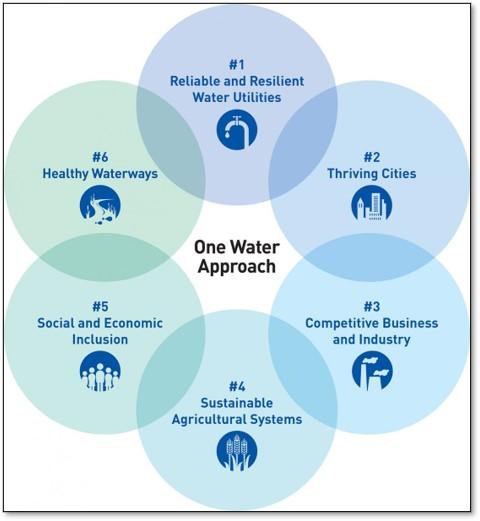
As the most populous county in North Carolina, with more than a million residents, Wake County takes proactive measures to maintain a clean and abundant water supply.
Our population is projected to double within the next 40 years, which will increase demand for drinking-water resources. That growth, coupled with less predictable concerns such as climate and environmental conditions, requires integrated and adaptive water management.
For the next two years, Wake County will be working with the community to develop a countywide “One Water Plan.” The 50-year One Water Plan integrates all water planning (water supply, wastewater treatment, stormwater and flood management, and groundwater protection) with County and municipal development and transportation planning. This One Water Plan aims to equitably support all aspects of our growing population and preserves our limited natural resources.
The One Water Plan will align with the following principles:
- Recognize that all water has value;
- Seek water solutions that provide economic, environmental, and social co-benefits;
- Advance regional collaboration; and
- Support equitable access to clean and abundant water for all.
The project includes three phases:
Visioning
During this process, Planners will review the County and municipal program operations and policies related to water management.
Assessment
Scientists will evaluate the resiliency of groundwater, stormwater, surface water and wastewater under the pressures of growth and weather extremes. The Team will gather data on water sources, including private wells, municipal systems and privately owned community systems. This information will help our community understand the state of our water resources and identify existing issues, with various scenarios tested to see how well Wake County would endure drought, development or climate changes.
Plan Development
Wake County will work with the community to develop strategies for long-term water security and sustainability. It will include actions to protect groundwater, mitigate the risk of flooding and prepare for climate impacts. The One Water Plan will identify opportunities to collaborate with other organizations and be a living document that the County updates frequently.
Wake County is working with consultants including Tetra Tech, Hazen & Sawyer, Research Triangle Institute and Public Participation Partners (P3). The plan will be implemented through budget, grants and public-private partnership.
Wake County Water Resources
There are three broad water supply categories used throughout Wake County:
- Private groundwater systems (wells) used in outlying and unincorporated areas.
- Surface-water sources provided by the major water utilities (municipal systems) that operate within the County and serve most of the County’s population. Four Wake County utilities are responsible for large-scale provision of water supply within the County: Raleigh Water, Cary-Apex, Holly Springs, Fuquay-Varina.
- Privately owned community systems that serve neighborhoods or subdivisions and rely on either groundwater sources or purchases from one of the larger municipal suppliers.
Wake County contains six water-supply watersheds. Over 40,000 private wells serve more than 90,000 residents, with the remainder of the population served by municipal and private utility systems. The County includes approximately 90,000 onsite wastewater (septic) systems, with municipal or private utilities providing wastewater services for the remaining population. The County manages stormwater within County jurisdictions and administers the stormwater ordinances for three additional municipal jurisdictions (Rolesville, Wendell and Zebulon).
What does One Water mean?

One Water is an integrated approach to water management. Surface water, groundwater, wastewater and stormwater are all interconnected and require one approach to management. Water is for everyone, and it should be accessible and affordable. This goal can be reached through integrated management of all types of water, in cooperation with communities.
The Water Research Foundation defines One Water with two core principles:
- All forms of water are valuable.
- One Water is an integrated planning and implementation approach to managing finite water resources for long-term resilience and reliability, meeting both community and ecosystem needs.
The U.S. Water Alliance’s publication Roadmap for One Water (2016) highlights the following aspects of the One Water Concept:
- A mindset that all water has value – from the water resources in our ecosystems to our drinking water, wastewater and stormwater – and must be managed carefully to maximize its benefits
- A focus on achieving multiple benefits, meaning that our water-related investments can and should provide economic, environmental and social returns to communities
- Approaching decisions with a systems mindset, one that considers the full life cycle of water and larger infrastructure systems
- Using watershed-scale thinking and action, which fosters regional collaboration and respects and responds to the natural ecosystem, geology, hydrology and social environment of an area
- Relying on cross-sector partnerships and the inclusion and engagement of all, recognizing that real progress will only be made when all members of the community have a seat at the table.
